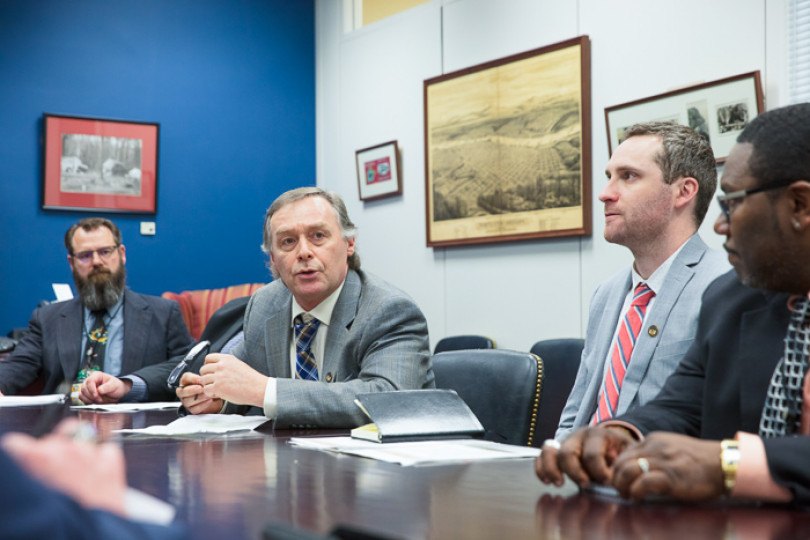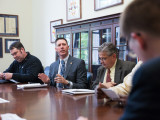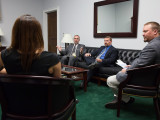L-502’s Mike Anthony, second from left, discusses CCUS funding with aides to Sen. Jeff Merkley (D-Oregon) with l. to r., Steve Behling, L-104; Travis Dilley, L-242; and Timothy Tibbs, L-290.
View Photo Gallery (5 photos)
Boilermakers seek consensus on energy, shipbuilding, health care and trade
LEAP DELEGATES FROM across the United States brought Boilermaker issues to the attention of legislators on Capitol Hill April 24-26, getting valuable face time with U.S. senators and representatives, as well as their staff.
This year, delegates sought action in four areas: a balanced energy policy that grows high-quality jobs and supports the research and development of carbon capture use and storage; support of fair trade deals that provide more equitable outcomes to working families, not more profits for multinational corporations; the preservation of the Jones Act (a law designed to protect domestic shipbuilding) and other issues important to U.S. shipbuilding; and the repeal of burdensome health care taxes, such as the Cadillac Tax (a 40 percent excise tax on the cost of employer-based health insurance above a certain threshold), which would impact the Boilermakers National Health and Welfare Fund and other such plans.
When meeting with two aides from the office of Sen. Jeff Merkley (D-Oregon), Mike Anthony, Local 502 (Tacoma, Washington), argued for clean coal technology and an “all of the above” energy policy. “In my local, we have a coal-fired boiler that’s destined to be shut down in 2020 and a sister boiler in 2025,” he said, noting that the impending shut-downs might not have happened if there had been money going into research for CCUS.
Driving the point home, International Rep Fred Rumsey asked an aide for help on CCUS tax credits. “Keep your ear to the ground on legislation coming through on a vote for 45Q [renewal of the U.S. statute providing for the credits],” he said. “We’d appreciate any efforts to support it.”
Other delegates visiting with Merkley aides were Steve Behling, Local 104 (Seattle); Deanna Cain, Local 290 (Bremerton, Washington); Travis Dilley, Local 242 (Spokane, Washington); IR Gary Powers; Ben Heurung, Local 104; Mark Leighton, Local 290; Rachel Montoy, Local 290; Erik Seaberg, Local 502; and Timothy Tibbs, Local 290.
Meeting with aides in the office of Sen. Pat Toomy (R-Pennsylvania), delegates from construction and shop Local 13 (Philadelphia), shipbuilding Local 19 (Philadelphia) and Local 154 (Pittsburgh) discussed the importance of the Jones Act. Delegates also sought funding for coal energy research and development. The delegation included Alex Biddy, Local 19; AD-CS/Canada Cory Channon; Sean Coleman, Local 13; Ray Doria, Local 154; James Hall, Local 19; Edward Harkins, Local 13; Acting Business Manager John Hughes, Local 154; and Max Tritz Jr., Local 19.
Delegates also met with their representatives from Congress. Abe Babcock, Rob Martin and Tim Timmons from Local 85 (Toledo, Ohio) met with an aide of Rep. Jim Jordan (R-4th Ohio). During the meeting, Timmons said the United States can’t rely on only one source of energy, particularly renewables. He also spoke about unfair trade deals like NAFTA (North American Free Trade Agreement), that hurts American workers.
“We don’t just support Democrats. We support anybody that supports a Boilermaker agenda.”
— Bob Hutsell, L-169
“All you have to do is go back to our district to see the devastation that’s been created by NAFTA, and other bad trade deals,” said Timmons. “What we’re looking for is for labor organizations to have input.”
In another lobbying effort, members from Local 169 (Detroit) met with an aide to Rep. Paul Mitchell (R-10th Michigan). Business Manager-Secretary/Treasurer Bob Hutsell said they reach across the aisle during visits to Capitol Hill. “We don’t just support Democrats. We support anybody that supports a Boilermaker agenda.”
During the meeting, delegate Jimmy Kaffenberger requested support for the Jones Act. “It seems like every year they try to weaken it. We believe it needs to stay strong.”
There was also a lively discussion on energy. Lori Custer explained the need for energy diversity. “Michigan is a manufacturing and industrial state, especially in the lower half of the state, and having a diverse portfolio of energy supply is essential for growth,” she said.
Other delegates in the meeting were Donald Fajardo, Kevin Tagger and Jim Calouette.
When meeting with Rep. Gary Palmer (R-6th Alabama), IR Ronnie Dexter and CSO Director of Recruiting Tim Simmons, both from Alabama, sought common ground with Palmer on onerous health care taxation.
“The Cadillac tax is ridiculous,” said Simmons. “It’s going to hit middle income people the hardest.”
Palmer agreed that health care needed reform. He said that even if people could afford the premium, they might not have enough money to use their policy if they became ill.
Simmons also pushed for better trade deals. “NAFTA wiped my town out. There’s no major industry in Centreville anymore,” he said.










